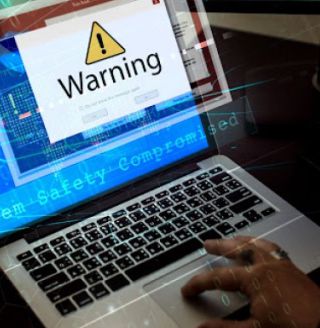A corporate cyber insurance policy protects your business from losses and liability resulting from cyber security breaches and theft, system hacking, ransomware extortion, and more. This insurance is popularly known as cyber liability insurance. With this policy, your business is shielded against cyber or digital risks which can otherwise result in financial loss as well as reputational damage to the insured.
Corporate cyber insurance coverage is essential if your business keeps sensitive data online or on a computer system. It has become a necessity in the modern business landscape as they help your business to stay protected.
Why Do All Businesses Need Corporate Cyber Insurance?
Certainly, every business that relies on technology and the internet requires these policies. Nowadays, more than ever, cyber criminals have ample opportunities to exploit electronic interconnections for their own benefit, given that email has replaced physical mail, and transactions are increasingly done online rather than in person.
Almost one-third of companies reported losing money to successful cyber attacks last year, according to Proofpoint's 2023 State of the Phish Report. Since last year, there has been an increase of 76% in the rate of successful phishing attacks. The majority of surveyed organizations across the globe reported experiencing at least one successful phishing attack in 2022, with more than half reporting three or more incidents. (Source: The Hipaa Journal)
Cybercrime attacks on company servers can result in substantial downtime for the organization. The downtime caused by viruses or ransomware can be enormous for your business. The costs of fixing the damage caused by the attack, as well as the loss of productivity, are always incurred whether you pay the ransom or not. This cost will be substantially higher than the cost of a cyber insurance policy.
In short, your business needs cyber liability insurance for financial protection, mitigating reputational damage, regulatory compliance, and peace of mind in the event it is victimized by any kind of cyber attack.
The Importance of Corporate Cyber Insurance in India
Internet technology keeps on evolving, and so do the tactics used by cybercriminals to commit crimes. A majority of companies in India today want to have an online presence and rely heavily on the internet to run their businesses. However, with increased internet usage also comes an increase in cyber threats. A Personal Data Protection Bill was proposed by the Ministry of Electronics and Information Technology in 2019 in order to counter this threat. Companies dealing with personal and financial information from customers are required to adhere to the provisions in the bill.
To ensure that there are no loopholes that cybercriminals can exploit, the finance ministry, in conjunction with the IRDAI, regularly updates the clauses to protect sensitive consumer financial data. Between 2020 and 2030, the demand for cyber insurance coverage is expected to grow by 26.3% CAGR according to a report in the Data Security Council of India (DSCI).
(Source: News Release)
Corporate cyber insurance provides a layer of financial protection to your business during cyber attacks so it is recommended by industry experts to purchase it in this digital age of internet dependence.
When looking for corporate cyber insurance, make sure to consider the following -
· Understand what your policy covers to the fullest extent.
· The policy may exclude certain types of cyber attacks and specific types of data. So, make sure you are aware of the exclusions.
· It is essential to understand what types of third-party liability your policy covers.
What Does Corporate Cyber Insurance Cover?
Cyber insurance is especially important for organizations that collect and store personal financial records and personal health records (such as credit card information, patient files, and doctor information). It's probably a good idea to prioritize cyber insurance if your business handles highly sensitive information. Other than that, on an individual level one can also invest in personal cyber insurance to protect themselves from the perils they can face due to cyber threats.
It is very vital that you make sure your cyber insurer clarifies what they will and won’t cover before you commit to one. However, cybersecurity liability coverage may vary in terms of coverage, limits, and exclusions. Moreover, a good corporate cyber insurance policy will cover the following expenses:
· First-party coverage - In the event of a data breach or cyber attack, this policy covers the cost of forensic investigations, data recovery, and business interruption losses.
· Third-party coverage - A cyber insurance policy covers the cost of cyber attacks made against your company or business by third parties, such as customers or partners.
· Crisis management - The cost of managing public relations and reputation damage resulting from cyber attacks is covered under this policy.
· Regulatory compliance - A cyber attack may result in legal obligations surrounding notification requirements, such as those under data protection laws.
What Corporate Cyber Insurance Doesn’t Cover
While every cyber liability policy is different, some common exclusions of a corporate cyber insurance policy are as under:
· Potential costs associated with future profits are not covered under this policy. Data breach impacts such as data damage or loss, public exposure of sensitive data, theft of intellectual property, and harm to brand reputation can continue for several years.
· A cyber insurance policy also does not cover the cost of loss of intellectual property value.
· Any cost that is associated with enhancing and upgrading your system or implementing new technology and control to bring cybersecurity to an improved level, is not covered under this policy.
Commonly Encountered Types of Cyber Liability Claims!
Cyber insurance claims typically stem from three primary categories of attacks: hacking, social engineering, and malware.
Hacking is the most prevalent type of cyberattack leading to insurance claims.
Phishing or social engineering attacks rely on employee involvement, while malware attacks come in various forms such as ransomware or spyware. Recovering from a malware attack can be both expensive and time-consuming.
How Much Does a Corporate Cyber Insurance Policy Cost?
New cyber threats are constantly emerging and evolving in the market, which has raised the price of policies sharply in the last few years. Cyberattacks are targeting businesses of all sizes, no matter whether they are small businesses or mid-sized companies. It is completely a myth that they are attacking or targeting only large scale businesses.
A typical cyber insurance policy for a small/medium business with a turnover of INR 10-50 crores could cost around INR 1.5 - 2 lakhs per annum(for a sum insured of 1 Crore, with a deductible of INR 10 lakhs).
However, your cyber insurance cost will depend on several key factors e.g. the type of business you run and the level of cyber risks you are exposed to.
Factors That Impact the Cost of Corporate Cyber Insurance Policy
Size of the company
The size of your company matters as the risk of phishing and social engineering attacks increases as your company grows in size due to the larger number of employees involved.
Those with micro or small businesses will pay less for cyber liability insurance than those with medium or large businesses. It is not wrong to say that insurance policies are formed according to size and complexity.
Industry
The industry you operate in is probably the most crucial factor in determining your cyber insurance needs and costs. This importance stems from the fact that different industries have varying levels of risk associated with cyber threats and data breaches.
Certain industries, such as healthcare or financial services, deal with sensitive customer data and are more likely to be targeted by cybercriminals. As a result, they may face higher premiums due to the increased likelihood and potential impact of a cyber incident.
Geographical and remote presence of your business
It is also common for companies to have a workforce in different countries, which leads to extra cybersecurity risks and usually requires new layers of security that are adapted to local regulations and contexts.
Kinds of coverage
The policies of organizations are also tailored according to the most common or dangerous risks they want to cover. The cost of cyber insurance for highly sophisticated attacks exceeds that for more common cyberattacks, such as ransomware through phishing emails, credential theft, and employee identity theft.
Level of Cyber Security
Insurers take into account the effectiveness and strength of a company's cybersecurity measures to assess the risk profile and potential exposure to cyber threats. Businesses that allocate substantial resources and efforts to combating cybercrime are likely to receive lower premiums as a reward from insurers.
Revenue of the company
The revenue coming from businesses can be a major factor in regulating the cost of losses or damages caused by cyberattacks that the insurer covers. This influences policy costs significantly.
How to Save Money on the Corporate Cyber Insurance Policy
As each business is different, it's impossible to make a precise guide on how to lower your cybersecurity insurance policy premiums. However, you can hedge your bets for your own benefit. We have curated a list of best practices to help you get a more manageable cyber security insurance premium.
By implementing multi-factor authentication (MFA)
The majority of cyber insurance providers now require multi-factor authentication as a security measure. This security control is critical for the following reasons:
· Cyberattacks begin with attempts to steal user credentials.
· Cybercriminals tend to use stolen credentials to gain access to private networks, so MFA could disrupt a majority of these attacks.
Execute a cybersecurity training program
Implementing a cybersecurity training program for company employees is very vital, as a good training program helps employees understand common threats like email phishing and other cyber attacks.
Manage the number of records you access, store, and transfer
Undoubtedly, better security means better money-saving for the company. You should consider your normal access, storage, and transfer of records when determining how much your cyber insurance policy will cost. If you want to keep your cyber insurance cost down then it is very significant to tightly control the volume of records you deal with. Apart from this, you can also sweep out old and unnecessary data.
Pay only for the coverage you want for your business
Usually, many companies pay for coverage they don't even need, or they deliberately buy too much coverage. So, it is very important to dive deep into your business environment to make sure you have coverage where you have the requirements.
Importance of Having the Right Cyber Insurance Advisor
It is important to note that every business organization has different risks and exposures, and the same Cyber Insurance solution won't work for all companies. Cyber insurance policies are not created or tailored equally.
A cyber insurance advisor plays a significant role in helping companies to find the right insurance coverage. They guide them through all the complicated aspects of the insurance market. The advice from cyber insurance brokers and risk advisors helps organizations find coverage that fits their unique needs by using their expertise and connections to top insurance carriers. Businesses can benefit from partnering with a cyber insurance broker to enhance risk management and maximize their investment. Following are some ways in which the right insurance advisor can help:
· Helps in understanding organizations their cyber risk profile.
· Cybersecurity insurance advisor helps in navigating industry changes
· An experienced cyber insurance broker can assist an organization in creating a culture of cyber security within the company, implementing best practices, and providing proper guidance and resources.
How Can Raghnall Help?
Raghnall is a reputed risk advisor and insurance broker in Mumbai, that provides businesses with exceptional risk management assistance. We offer cyber insurance solutions that effectively meet clients requirements. Raghnall helps you with the greatest assistance and resources by using their expertise and connections with reputed insurance companies.
You can rely on Raghnall to provide you with customized coverage tailored to your needs, as well as Insurance and Reinsurance solutions tailored to your requirements. Regardless of where the best solution may lie, our teams specialize across various sectors to understand your needs and procure insurance coverage from the most suitable source.
Get in touch with Raghnall today to learn how we can help you get the right corporate cyber insurance coverage for your business.
.png)








Leave A Comment